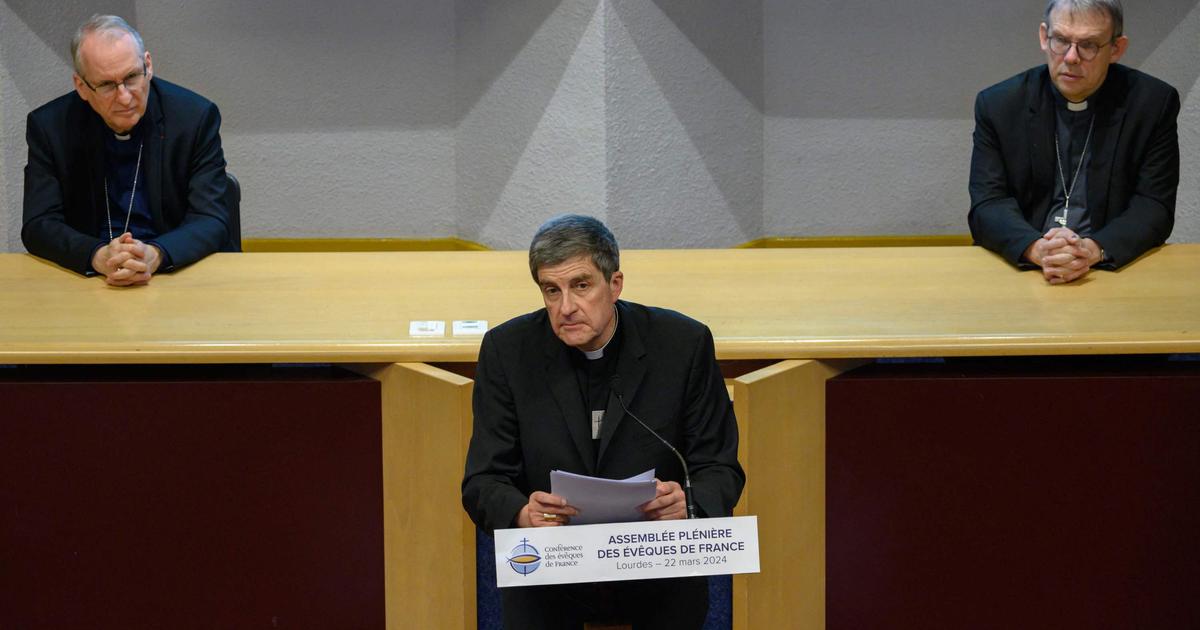Does a priest who learns of the existence of a crime during a confession remain in secrecy?
The debate was revived by the statements of the President of the Conference of Bishops of France (CEF), Eric de Moulins-Beaufort, on the secrecy of confession, on France Info on Wednesday, which occurred after the submission of the report of the Independent Commission on abuses in the Church (Ciase), reporting thousands of testimonies from victims of sexual violence.
The controversy is such that the Minister of the Interior, Gerald Darmanin, summoned the archbishop next Tuesday "to ask him to explain his words".
Government spokesman Gabriel Attal reminded him that there was "nothing stronger than the laws of the Republic".
In law, the professional secrecy imposed on clergymen can be lifted under several readings.
Explanations.
What did Monsignor Eric de Moulins-Beaufort say?
The sentence struck more than one.
"The secrecy of confession is imposed on us and is above the laws of the Republic", defended Wednesday the president of the Conference of the bishops.
Thus, according to him, a priest to whom one would have confessed sexual violence suffered or inflicted on a third person, could not report it, insofar as this word was shared in a confessional.
"Confession is a moment during which a person can reveal what they are going through or what they are wearing, in all confidence, because the secret allows them to say what is the most difficult", insisted a few hours later on Twitter the Archbishop of Reims.
The clergyman thus positions himself against a recommendation in the Ciase report, according to which the secrecy of confession can be lifted in the case of "serious attacks on minors or vulnerable persons".
Are priests subject to professional secrecy?
In French law, professional secrecy, which concerns in particular doctors and lawyers, can also extend to ministers of religion, analyzes a circular from the Ministry of Justice dating from 2004.
In canon law (the law of the Catholic Church), which does not take precedence over French law, “it is absolutely forbidden for the confessor to betray a penitent in anything, by words or in any other way, and for whatever reason.
If the priest does not submit to it, he can be excommunicated.
Read alsoSexual abuse in the Church: the "shame" and "immense sorrow" of the Pope in the face of this "appalling reality"
In 2019, however, Pope Francis issued a “motu proprio” (a letter amending Church law) requiring priests and men and women religious to report to the Church any suspicion of sexual assault or harassment, as well as any suspicion of sexual assault or harassment. coverage of such facts by the Catholic hierarchy.
With a caveat: the secrecy of confession, he insists, remains absolute.
What does criminal law say?
Even if professional secrecy can therefore concern ecclesiastics, there are possibilities for them to extricate themselves from it, summarizes the professor of private law and criminal sciences Jocelyne Leblois-Happe in her article “Religious secrecy and criminal law”, published. in 2005. They can rely on article 226-14 of the Penal Code which exempts from prosecution anyone who “informs the judicial, medical or administrative authorities of deprivation or abuse, including in the case of attacks or sexual mutilation, of which he was aware and which were inflicted on a minor or on a person who is unable to protect himself because of his age or his physical or mental incapacity ”.
The professional can also invoke "the state of necessity", that is to say "the situation of a person who, to avoid a greater evil, deliberately chooses to commit an offense". Last possible case: when the person who shared the secret consents to it being broken.
A priest therefore has the power, under criminal law, to break professional secrecy.
However, he does not have the obligation, specifies a judicial source at AFP Factuel, with a caveat: priests, like all French citizens, "are liable to be prosecuted for non-prevention of a crime if the elements constituents are brought together ”.
Article 223-6 of the penal code provides that "whoever can prevent by his immediate action, without risk to him or to third parties, either a crime or an offense against the bodily integrity of the person voluntarily abstains doing so is punished by 5 years' imprisonment and a fine of 75,000 euros ”.
What are the stakes for ecclesiastics?
It will be understood that the question of lifting the secrecy of confession polarizes the tensions between the religious world, politics and civil society. “It turns out that until now there has been no case law, but there is no reason why the law of the Republic should not apply to priests. It's a bit as if an imam said that sharia applies where he wants it to apply despite French law, ”thunders law professor Christine Lazerges, member of Ciase.
Contacted, the Conference of Bishops of France maintains the declarations of its president, replies that we cannot “oppose the laws of the Republic and the secrecy of confession”.
“The challenge is to allow the confessional to be the first step in a path of liberation of the word.
Because the people who come to confess, do it precisely because they know that there is this secret ”, we slip within the episcopal conference.
Read alsoSexual abuse in the Church: "At nightfall, I was his toy"
How then to accept this word?
Priests have the means to accompany a victim other than by violating the secrecy of confession, insists the CEF.
A confession can thus be the subject of a “confidence”, after the confessional.
"In this case, we will encourage the person to speak and indicate the right people and numbers to contact in the event of serious problems", continues the institution.
One of the keys would thus be to strengthen the formation of priests in order to best guide those who wish in their process.
This argument, however, does not convince Ciase, who has difficulty in imagining a victim repeating over and over again the traumatic accounts of his abuse.









